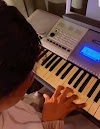### Why Your Piano Playing Might Be Boring
Many pianists, both beginners and more experienced players, often face the challenge of making their piano playing sound engaging and dynamic. If you find that your piano playing feels boring, it could be due to several factors. Here are some common reasons why this might be happening, along with suggestions on how to overcome them.
**1. Lack of Dynamics and Expression:**
Music is a language of emotion, and dynamics (variations in loudness) and expression are essential for conveying feelings. Playing everything at the same volume can make your performance sound flat and lifeless.
**Solution:**
- Experiment with dynamics by varying the volume within your pieces. Play some sections softly (piano) and others loudly (forte).
- Use techniques like crescendo (gradually getting louder) and diminuendo (gradually getting softer) to add interest.
- Pay attention to phrasing and articulation. How you connect notes (legato) or separate them (staccato) can significantly affect the expressiveness of your playing.
**2. Monotonous Rhythm:**
Rhythm is a crucial component of music. If your rhythm is monotonous and lacks variety, your playing can quickly become predictable and dull.
**Solution:**
- Practice with a metronome to develop a strong sense of timing, but don't be afraid to deviate from strict tempo when appropriate for expressive purposes.
- Introduce syncopation (off-beat rhythms) and experiment with different time signatures to add rhythmic interest.
- Pay attention to rhythmic patterns and make sure to emphasize the natural ebb and flow of the music.
**3. Limited Repertoire:**
Playing the same pieces over and over can lead to boredom for both the player and the listener. A limited repertoire restricts your ability to showcase different styles and techniques.
**Solution:**
- Broaden your repertoire by learning pieces from various genres and time periods.
- Challenge yourself with pieces that introduce new technical or musical concepts.
- Regularly update your practice list to keep things fresh and interesting.
**4. Over-reliance on Sheet Music:**
Sticking rigidly to sheet music without adding personal interpretation can make your playing sound mechanical.
**Solution:**
- Once you are comfortable with a piece, try to play it from memory to allow more freedom and personal expression.
- Add your own nuances and interpretations. Think about the story or emotion behind the piece and try to convey that through your playing.
- Listen to different interpretations of the same piece by various pianists to gain new insights and ideas.
**5. Poor Technical Skills:**
Technical deficiencies can limit your ability to play pieces as they are meant to be played, resulting in a dull performance.
**Solution:**
- Invest time in regular technical exercises such as scales, arpeggios, and finger independence drills.
- Work on specific techniques that are weak points for you, whether it's hand coordination, pedaling, or finger strength.
- Consider taking lessons from a qualified teacher who can provide personalized feedback and help you improve your technique.
**6. Lack of Emotional Connection:**
Playing without feeling connected to the music can lead to uninspired performances. If you don't feel the music, your audience won't either.
**Solution:**
- Choose pieces that resonate with you personally and that you enjoy playing.
- Spend time understanding the context and background of the pieces you play. Knowing the story behind a composition can help you connect emotionally.
- Before playing, take a moment to internalize the mood and message you want to convey.
In summary, making your piano playing more engaging requires attention to dynamics, rhythm, repertoire, technical skills, and emotional connection. By addressing these areas, you can transform your performances from mundane to mesmerizing, capturing the interest and emotion of your listeners.
**What do you think? Have you experienced any of these issues in your piano playing, and how did you address them?**









0 Comments